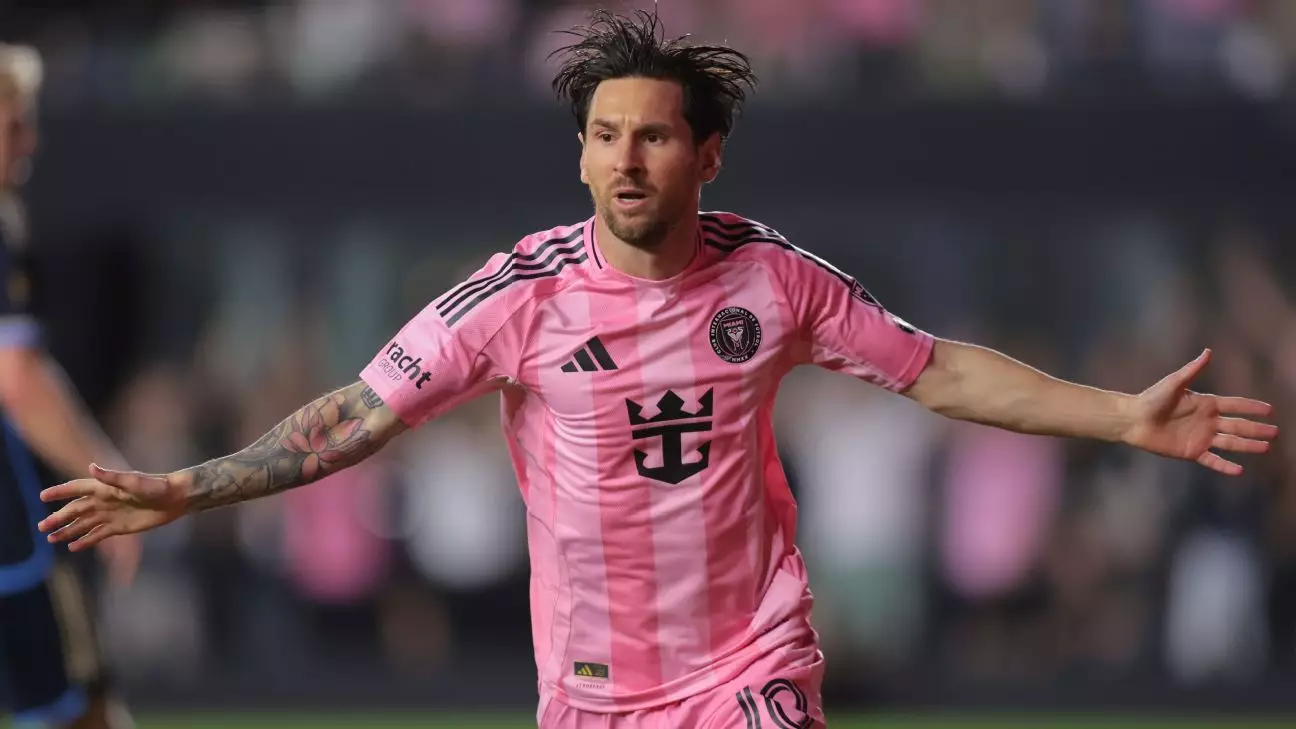On a night charged with anticipation, Lionel Messi marked his return to Inter Miami in resounding fashion. The buzz surrounding the eight-time Ballon d’Or winner was palpable as he stepped onto the pitch against the Philadelphia Union, and within mere minutes of his arrival, the gravity of his presence became unequivocally clear. Scoring just two minutes after subbing in, Messi secured a 2-1 victory for the South Florida team, propelling them to the pinnacle of the Major League Soccer’s Eastern Conference. His swift impact not only showcased his individual brilliance but also reignited Inter Miami’s aspirations for a winning season.
Messi’s decisive goal unfolded with trademark precision. Receiving a well-timed pass from Luis Suárez, he deftly maneuvered within the penalty area, evading defenders with an agility that defies his years. His right-footed strike found the back of the net, a moment that solidified his role as a transformative figure for Miami, both on and off the field. This was more than a goal; it was an emblem of hope and potential as Messi continues to rewrite the narrative of his career in the United States.
Strategic Management of Talent
Inter Miami’s head coach, Javier Mascherano, adopted a commendable strategy in easing Messi back into the competition. Acknowledging the risks associated with Messi’s recent adductor injury, which had kept him sidelined for crucial World Cup qualifiers, Mascherano’s cautious approach emphasized the long-term view. In the press conference that followed the game, he confessed that the intention was to limit Messi’s playing time to around 30-35 minutes. Yet, the Argentine maestro managed to surpass that across the added time, concluding the match with a flourish.
This method of management sheds light on a vital aspect of contemporary sports coaching—balancing immediate performance needs with the health and sustainability of key players. Especially when balancing the demands of international play with the competitive seasons in club football, managing high-profile athletes like Messi requires a nuanced understanding of their physical limitations. It’s clear Mascherano’s strategy paid off; Messi’s ability to contribute meaningfully while moderating risks could set a precedent for how clubs navigate injuries in elite sports.
The Collective Effort
While Messi’s stellar individual performance was the highlight, it is essential to recognize the cohesive effort from the entire Inter Miami squad. The team of players exemplified a robust game strategy that commenced well before Messi’s entrance. Robert Taylor initiated the scoring in the 23rd minute, courtesy of assists from Benjamin Cremaschi and Jordi Alba. The chemistry displayed on the field reinforced the notion that while one player may shine brightly, it often takes a team of dedicated individuals to illuminate the path towards victory.
The collaboration didn’t cease with Messi’s introduction. His teammates—most notably Suárez—were crucial in positioning Messi for his spectacular goal. This interconnected play is indicative of Inter Miami’s growth under Mascherano’s stewardship. The blend of youthful exuberance and seasoned craftsmanship creates an atmosphere ripe for success, as players work collectively to foster a strong team dynamic.
Looking Forward: The Next Challenge
With the victory against the Philadelphia Union, Inter Miami stands poised for an upcoming showdown against LAFC in the first leg of the Concacaf Champions Cup series. The stakes will be high, and preparation will be paramount. As Messi continues to rehabilitate and regain his match fitness, his anticipated role in the Champions Cup will undoubtedly be a focal point. The prospect of advancing in another major competition could elevate Miami to new heights and solidify its status as a formidable contender on both domestic and international levels.
Mascherano’s strategic foresight in Messi’s utilization thus far will be under scrutiny as the team’s next challenge approaches. The coach’s comments about the goal of recuperation before taking flight to Los Angeles emphasize an understanding that success in soccer is not only about immediate results but also about ensuring that superstars like Messi are fit for the long haul.
The exhilaration surrounding Messi’s performance reinstates a vital truth in sports: the return of a star can reinvigorate a team, create momentum, and foster an unyielding belief in victory. All eyes will remain on Inter Miami, eager to witness how Messi’s resurgence further influences the dynamic landscape of Major League Soccer.

